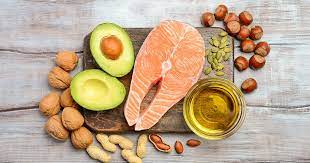Definition
Fat is an essential macronutrient and energy source for the body. Dietary fats and body fat tissue serve multiple functions related to energy storage, hormone regulation, nutrient absorption, and more.
Explanation
- Dietary fats are consumed in foods and provide 9 calories per gram, more than carbs or protein (4 cals/gram). They are broken down into fatty acids.
- Body fat tissue comes from excess calories converted into triglyceride storage. Essential body fat protects organs and provides energy reserves.
- Fats support vitamin absorption, hormone production, cell growth, and inflammation. The type of fat determines its health impacts.
- Good fats are unsaturated like olive oil. Bad fats are saturated and trans fats that raise cholesterol and disease risk.
Examples
- Avocados, nuts, salmon – sources of healthy unsaturated fats
- Subcutaneous fat, visceral fat, adipose tissue
Related Terms
- Lipids, triglycerides, cholesterol, HDL, LDL, omega fatty acids, trans fats
Common Questions
- Is fat bad for you? No, some fats are essential for health. But excess and poor quality fats are harmful.
- How much fat should I eat? 20-35% of total daily calories should come from healthy unsaturated fats.
Do Not Confuse With
- Carbohydrates and protein – The other macronutrients that also provide calories.
63
/ 100
SEO Score
Thank you for reading this post, don't forget to subscribe to our free newsletter
!
